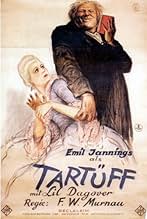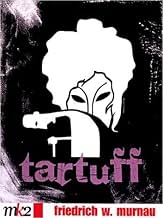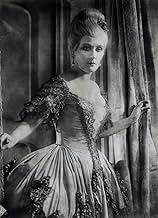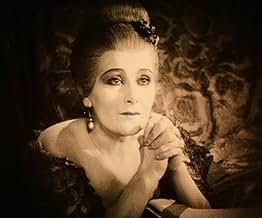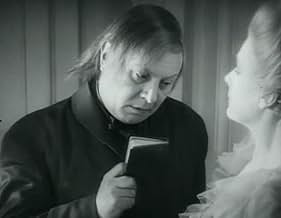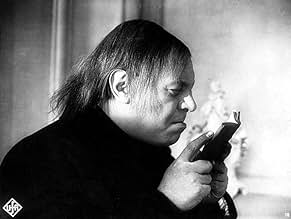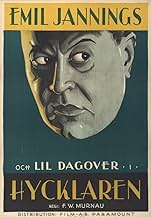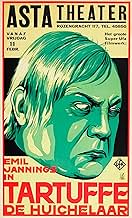ÉVALUATION IMDb
7,1/10
2,9 k
MA NOTE
Ajouter une intrigue dans votre langueA young man shows his millionaire grandfather a film based on Molière's Tartuffe, in order to expose the old man's hypocritical governess who covets his own inheritance.A young man shows his millionaire grandfather a film based on Molière's Tartuffe, in order to expose the old man's hypocritical governess who covets his own inheritance.A young man shows his millionaire grandfather a film based on Molière's Tartuffe, in order to expose the old man's hypocritical governess who covets his own inheritance.
Avis en vedette
As I've discovered after relatively recent viewings of 'Nosferatu (1922),' 'The Last Laugh (1924)' and 'Faust (1926),' F.W. Murnau was one of the most exciting and influential European directors working during the 1920s. His contributions towards early German cinema are rivalled only by Fritz Lang, and his ability to use lighting and shadows to create atmosphere are almost unparalleled. 'Herr Tartüff / Tartuffe (1926)' was apparently forced upon Murnau by contractual obligations with Universum Film (UFA), and you suspect that perhaps his heart wasn't quite in it, but the end result nonetheless remains essential viewing, as are all the director's films. The story is based upon Molière's successful 1664 play, "Tartuffe," which explored the notion of hypocrisy, particularly among self-proclaimed religious "devotees." Murnau and screenwriter Carl Mayer stripped the story to its bare essentials, removing any extraneous supporting characters and creating a close-knit triangle Herr Orgon, Frau Elmire and Tartüff around which the story revolves. Murnau also added an interesting framing device, whereby the story of Tartuffe becomes a film-within-a-film that a young actor shows to his grandfather to warn of his housekeeper's evil intentions.
Interestingly, I found the story's prologue of the old man and his scheming housekeeper to be a more engrossing story than the film that the characters are later shown. The conniving old woman (Rosa Valetti), with a devilish grin like a Cheshire Cat, manages to convince her senile employer (Hermann Picha) that his grandson has dishonoured the family name by becoming an actor, and so she sets herself up to inherit his entire fortune. When the sincere young actor (André Mattoni) finds out about this betrayal, he plans an ingenious stratagem to outwit the malicious housekeeper and convince his grandfather of her evil. Murnau was obviously a great believer in the power of cinema, and so it's no surprise that the young man chooses the cinematic medium with which to reveal the ultimate truth about hypocrites. The film, by employing a few deceptively simple shots, immediately translates the inner motivations driving each character: the housekeeper, greedy and malevolent, kicks aside her master's slippers, whereas the kind, loving grandson delicately sets them back into place. Also notable is a moment during the narrative when the young actor turns to the camera and addresses the audience directly, one of the earliest instances I've seen of a character "breaking the fourth wall."
The tale of Tartuffe himself is also worth watching for its technical accomplishments, even if the story itself seems somewhat generic and uninteresting. Most astounding is Murnau's exceptional use of lighting {assisted, of course, by cinematographer Karl Freund}, and, in many cases, entire rooms are seemingly being illuminated only by candlelight. This story concerns a happily-married woman, Frau Elmire (Lil Dagover), who is distraught to discover that her beloved husband, Herr Orgon (Werner Krauss), has become obsessed with Tartüff (the great Emil Jannings), a grotesque little man who speaks with divine importance and claims to be a Saint. However hard she tries, Elmire cannot convince Orgon that he has been duped by a religious fraud, so great is the cunning of Tartüffe's deception. In the film, Jannings predictably gives the finest performance, playing the unsavoury title character with a mixture of sly arrogance and lustful repugnance. Nevertheless, the role falls far short of the silent actor's greatest performances, which include Mephisto of 'Faust (1926)' and the hotel porter from 'The Last Laugh (1924).'
Interestingly, I found the story's prologue of the old man and his scheming housekeeper to be a more engrossing story than the film that the characters are later shown. The conniving old woman (Rosa Valetti), with a devilish grin like a Cheshire Cat, manages to convince her senile employer (Hermann Picha) that his grandson has dishonoured the family name by becoming an actor, and so she sets herself up to inherit his entire fortune. When the sincere young actor (André Mattoni) finds out about this betrayal, he plans an ingenious stratagem to outwit the malicious housekeeper and convince his grandfather of her evil. Murnau was obviously a great believer in the power of cinema, and so it's no surprise that the young man chooses the cinematic medium with which to reveal the ultimate truth about hypocrites. The film, by employing a few deceptively simple shots, immediately translates the inner motivations driving each character: the housekeeper, greedy and malevolent, kicks aside her master's slippers, whereas the kind, loving grandson delicately sets them back into place. Also notable is a moment during the narrative when the young actor turns to the camera and addresses the audience directly, one of the earliest instances I've seen of a character "breaking the fourth wall."
The tale of Tartuffe himself is also worth watching for its technical accomplishments, even if the story itself seems somewhat generic and uninteresting. Most astounding is Murnau's exceptional use of lighting {assisted, of course, by cinematographer Karl Freund}, and, in many cases, entire rooms are seemingly being illuminated only by candlelight. This story concerns a happily-married woman, Frau Elmire (Lil Dagover), who is distraught to discover that her beloved husband, Herr Orgon (Werner Krauss), has become obsessed with Tartüff (the great Emil Jannings), a grotesque little man who speaks with divine importance and claims to be a Saint. However hard she tries, Elmire cannot convince Orgon that he has been duped by a religious fraud, so great is the cunning of Tartüffe's deception. In the film, Jannings predictably gives the finest performance, playing the unsavoury title character with a mixture of sly arrogance and lustful repugnance. Nevertheless, the role falls far short of the silent actor's greatest performances, which include Mephisto of 'Faust (1926)' and the hotel porter from 'The Last Laugh (1924).'
When first performed at Versailles in 1664 his play 'Tartuffe' landed Moliere in all sorts of trouble due to its depiction of impiety and religious hypocrisy. Apparently the Archbishop of Paris threatened anyone with excommunication who performed, watched or even read it! It was finally staged with great success in 1669 in the five act version we know today. Obviously humbled by the experience Moliere's satire was never again quite as scathing. The film under review is extremely scathing however and presents Tartuffe in the person of Emil Jannings as a monster of avarice and lechery.Well, nobody's perfect! His true nature is finally revealed and Orgon, played by Werner Krauss is reunited with his wife Elmire, portrayed by Lil Dagover, who had been estranged due to Tartuffe's evil influence. Only these three characters plus Lucie Hoflich as Dorine the housekeeper remain from Moliere's original so this piece cannot be judged as a film of the play. Purely as a film it is exceptionally well made and acted. This is hardly surprising as some of the greatest talents of Weimar cinema are involved. The 'film-within-a-film' concept of the brilliant but ill-fated Carl Mayer is inspired. Director Murnau has once again the services of the superlative Karl Freund behind the camera whilst Walther Rohrig and Robert Herlth contribute their magnificent art direction. It is beyond the power of words of course to define the breadth of Murnau's talent. Werner Krauss is a terrifyingly good actor and makes the most of a pretty thankless part. Although Jannings was dismissed by Dietrich as 'an old ham' it was always, well, nearly always, ham of the finest quality. This is also the first film of the lovely Camilla Horn who is uncredited as Lil Dagover's stunt double! She went on the following year to make her mark as Gretchen in 'Faust' for the same director. 'Tartuffe' is highly recommended for those few who appreciate film as an art form.
Personally I think the other reviewers have been way too hard on this film, and I certainly don't agree that it is "extremely average", "throwaway" or "plain and forgettable". OK - it's not his best by a long shot, but Murnau was such a talented directer/artist that even his weaker films urinate all over the films of most other directors. I thought that the 'film within a film' structure of it worked brilliantly. The cast were all excellent in their acting. The film is pretty great visually too (as one would expect from Murnau) - the 'outer' film is shot in a crisp, modernist style, with adventurous camera angles and no make up, while the central 'film within a film' section was filmed in a more classical, soft-focus style. The film was also quite risky for it's time in its depiction of sexuality, and corruption within the clergy, and several scenes were censored for American audiences.
The central theme of the film is hypocrisy, particularly with those who are overly pious, judgemental and puritanical. This is encapsulated in the words of Tartuffe when he admits: "Who sins in secret - does not sin". Murnau expertly exposes the true roots of fanatically pious behaviour - behind which lies its very opposite. This is very similar to what Freud termed 'reaction formation', whereby a character trait or impulse which one finds unbearable to oneself (the ego) is disguised and repressed by bringing a complete opposite tendency to the facade of ones personality - but this is always noticeable by its exaggeration. The Tartuffe character also indulges in another Freudian defence mechanism called 'projection', whereby one relieves the anxiety caused by an unwelcome trait by projecting it onto others.
It's important to mention that this film also works brilliantly as a satire, and at times I found myself laughing out loud at the grotesque character of Tartuffe. In one scene the obedient Emile is seen rocking Tartuffe as he yawns and lazes in a hammock like a selfish baby. Yet despite the ridiculing, there is always a deep humane concern underlying the film - as there is with all of Murnau's films.
So, like I said: this is not one of his best, but any Murnau film is worth seeing.
The central theme of the film is hypocrisy, particularly with those who are overly pious, judgemental and puritanical. This is encapsulated in the words of Tartuffe when he admits: "Who sins in secret - does not sin". Murnau expertly exposes the true roots of fanatically pious behaviour - behind which lies its very opposite. This is very similar to what Freud termed 'reaction formation', whereby a character trait or impulse which one finds unbearable to oneself (the ego) is disguised and repressed by bringing a complete opposite tendency to the facade of ones personality - but this is always noticeable by its exaggeration. The Tartuffe character also indulges in another Freudian defence mechanism called 'projection', whereby one relieves the anxiety caused by an unwelcome trait by projecting it onto others.
It's important to mention that this film also works brilliantly as a satire, and at times I found myself laughing out loud at the grotesque character of Tartuffe. In one scene the obedient Emile is seen rocking Tartuffe as he yawns and lazes in a hammock like a selfish baby. Yet despite the ridiculing, there is always a deep humane concern underlying the film - as there is with all of Murnau's films.
So, like I said: this is not one of his best, but any Murnau film is worth seeing.
While this film does not have the amazing scenes with breathtaking cinematography like FAUST or SUNRISE, this Murnau film still does excel due to the camera-work and great care taken in its production. And, while not the very best silent film available, it's certainly among the better ones.
This story differs from Molière's play in that the entire play is actually part of a larger story--with a prologue and epilogue. The story begins with a rich old man living alone with his supposedly devoted housekeeper. She has convinced the man that his grandson is evil and should be disinherited because he is, oh, horrors,...an ACTOR!!! Instead, she's fooled him into making her the beneficiary. When the grandson shows up to say hello, the old man chases him away and it appears the housekeeper has won. However, given that the young man is an actor, he dresses up as a traveling showman and comes to the house to show them a film--TARTUFFE.
The film stars Emil Jannings as the evil priest, Tartuffe, who has fooled a rich nobleman into forsaking the pleasures of life and becoming an aesthetic, like him. But, the man's wife soon realizes the priest is a charlatan and much of the movie is spent trying to trap the priest in his lies. Naturally, all this is symbolic of the relationship between the housekeeper and the rich man.
The sets, direction and acting are all excellent. The acting is rather restrained compared to some silent films and the story is told in a brisk and watchable manner.
This story differs from Molière's play in that the entire play is actually part of a larger story--with a prologue and epilogue. The story begins with a rich old man living alone with his supposedly devoted housekeeper. She has convinced the man that his grandson is evil and should be disinherited because he is, oh, horrors,...an ACTOR!!! Instead, she's fooled him into making her the beneficiary. When the grandson shows up to say hello, the old man chases him away and it appears the housekeeper has won. However, given that the young man is an actor, he dresses up as a traveling showman and comes to the house to show them a film--TARTUFFE.
The film stars Emil Jannings as the evil priest, Tartuffe, who has fooled a rich nobleman into forsaking the pleasures of life and becoming an aesthetic, like him. But, the man's wife soon realizes the priest is a charlatan and much of the movie is spent trying to trap the priest in his lies. Naturally, all this is symbolic of the relationship between the housekeeper and the rich man.
The sets, direction and acting are all excellent. The acting is rather restrained compared to some silent films and the story is told in a brisk and watchable manner.
Based on Moliere's classic seventeenth century comedy, this version of TARTUFFE has the eponymous antihero (Emil Jannings) being ultimately outwitted by the family; at the same time the head of the family Orgon (Werner Krauss) remains as blissfully unaware of how to distinguish truth from falsity as he did at the beginning. F. W. Murnau's version is set in a large, rambling house, full of wide staircases and plenty of doors. He proves himself a master of the camera; his close-ups focusing on the pockets as Tartuffe stashes away his ill-gotten gains while pretending to embrace religion, or on Elmire's (Lil Dagover's) breasts, as Tartuffe tries and fails to keep his hands from touching them. Jannings is given full rein to show off his range of facial expressions as Tartuffe; here is a genuinely evil man who believes he can do anything under the cloak of religion. What makes this TARTUFFE most interesting, at least for students of history, is the specially-added prologue and epilogue, in which a young man (André Mattoni) shows his wealthy grandfather (Hermann Picha) the film of TARTUFFE, in order to alert him to the old man's hypocritical governess (Rosa Valetti), and her designs on his fortune. The young man is impoverished, but shown to be much more able to understand human behavior than his grandfather. Through this device Murnau takes a pot-shot at how capitalism and wealth often destroys judgment, creating a covetous society in which everyone is out for themselves. This could be a microcosm of Germany in the mid- Twenties, before the Nazi accession to power. This TARTUFFE moves along at a brisk pace, complemented by a jaunty soundtrack. Worth watching.
Le saviez-vous
- AnecdotesCamilla Horn served as Lil Dagover's foot double in this film. This small role effectively launched her lengthy acting career, as she was noticed by director F.W. Murnau and cast as the lead actress in his film, Faust (1926).
- Autres versionsThis film was published in Italy in an DVD anthology entitled "Il castello di Vogelod", distributed by DNA Srl. The film has been re-edited with the contribution of the film history scholar Riccardo Cusin . This version is also available in streaming on some platforms.
- ConnexionsFeatured in Dämonische Leinwand - Der deutsche Film der zwanziger Jahre (1998)
Meilleurs choix
Connectez-vous pour évaluer et surveiller les recommandations personnalisées
Détails
- Durée1 heure 14 minutes
- Couleur
- Mixage
- Rapport de forme
- 1.33 : 1
Contribuer à cette page
Suggérer une modification ou ajouter du contenu manquant

Lacune principale
By what name was Herr Tartüff (1925) officially released in Canada in English?
Répondre
